“If I have told you earthly things, and ye believe not, how shall ye believe, if I tell you of heavenly things?”
— The Gospel of John 3:12 KJV
Previous Entries
“Yea, hath God said” is a tried and true tactic that the deceiver has deployed to shake mankind’s faith since the very beginning of creation.
Heliocentrism is perhaps the most potent weapon in Satan’s arsenal of disbelief, one that has borne centuries of fetid fruit. Since 1543, this theory is the primary method through which all subsequent apostasies have flowed. We don’t get Darwin’s theory of evolution, we don’t get an Earth that is billions of years old, we don’t get the Big Bang theory without heliocentrism. Nietzsche, one of modern atheism’s most prolific philosophers, realized the magnitude of what heliocentrism did to man’s belief in our Creator (emphasis mine):
“Whither is God?” he cried. “I shall tell you. We have killed him — you and I. All of us are his murderers. But what did we do when we unchained this earth from its sun? Whither is it moving now? Whither are we moving now? Away from all sides? Are we not plunging continually backward, sideward, forward, in all directions? Is there an up or down left? Are we not straying as through an infinite nothing? Do we not feel the breath of empty space? Has it not become colder? Is not night and more night coming on all the time?…”
- Friedrich Wilhelm Nietzsche, The Parable of the Madman
The enemies of Christ know full well what their doctrines have wrought: it is far past the time that the Church realizes it as well.
As Christians have strayed further and further from Sola Scriptura, our understanding of creation and our cosmos has strayed further and further from God’s timeless truths. Paul warns us of the dangers of this worldly wisdom in his First Epistle to the Corinthians: “For the wisdom of this world is foolishness with God. For it is written, He taketh the wise in their own craftiness.” (3:19) The Church has largely rejected the clear words of Moses, of Christ, of his Prophets & Apostles; instead, we have substituted the doctrines of God for the doctrines of Men. We have rejected the Wisdom of God, and instead have conformed to the wisdom of this world.
This is certainly nothing new, as Paul warned Timothy of these same objections by “science, falsely so called” during the inception of Christ’s Kingdom. The great Reformer struggled with these issues in his own day and age as well (emphasis mine):
“We Christians must be different from the philosophers in the way we think about the causes of these things. And if some are beyond our comprehension (like those before us concerning the waters above the heavens), we must believe them and admit our lack of knowledge rather than either wickedly deny them or presumptuously interpret them in conformity with our understanding.”
– Martin Luther
Indeed, to force our man-made wisdom onto God’s Word has led to disastrous consequences for the Church. If you disagree, merely look at the decrepit, anemic, and utterly debased state of so many “churches” across our world.
We must unlearn the wisdom of this world, and we must relearn the Wisdom of God.
— The Hebrew cosmological model.
So what is the Firmament then?
Firstly, let us define our terms. As Paul details in 2 Corinthians 12:2, there are three heavens, or shamayim in Hebrew. The first is the sky (Genesis 1:26, James 5:18), the second is called the Firmament (Genesis 1:8), and the third is the Heaven of Heavens (1 Kings 8:27). The English word firmament is derived from the Latin word firmamentum, meaning that which strengthens or supports. The Hebrew word seen 17 times in Holy Scripture to describe the Firmament is raqia, meaning:
expanse (flat as base, support)
firmament (of vault of heaven supporting waters above)
considered by Hebrews as solid and supporting 'waters' above
Yeah I wonder why they thought that. Raqia is derived from the Hebrew word raqa, meaning:
to beat, stamp, beat out, spread out, stretch
(Qal)
to stamp, beat out
one who beats out (participle)
(Piel) to overlay, beat out (for plating)
(Pual) beaten out (participle)
(Hiphil) to make a spreading (of clouds)
We see from the root word raqa that what is being described is a solid covering that is spread out over the Earth, something that all the verses pertaining to the Firmament affirm.
As Strong’s Concordance also notes, the ancient Hebrews universally understood the Firmament to be a crystalline or hard dome placed over the Earth (emphasis mine):
After this, on the second day, he placed the heaven over the whole world, and separated it from the other parts, and he determined it should stand by itself. He also placed a crystalline [firmament] round it, and put it together in a manner agreeable to the earth, and fitted it for giving moisture and rain, and for affording the advantage of dews.
— Flavius Josephus, Antiquities of the Jews
Despite the tortured explanations — such as the Canopy Theory — that Biblical creationists must proffer to conform with so many supposed scientific discoveries, the clear words of Genesis, Psalms, Job, Ezekiel and Isaiah establish the fact that the Firmament is a solid object covering the Earth.
As is my preference, I will add as little commentary as I possibly can, as the totality of Holy Scripture makes it clear what and where the Firmament is (all emphasis below is mine):
6 And God said, Let there be a firmament in the midst of the waters, and let it divide the waters from the waters.
7 And God made the firmament, and divided the waters which were under the firmament from the waters which were above the firmament: and it was so.
8 And God called the firmament Heaven. And the evening and the morning were the second day.
— Genesis 1:6-8 KJV
The Firmament was established to separate the LORD’s throne from the Earth, and to divide the waters.
As I have covered in BC I: What is a Star?, the stars, Sun, and Moon are placed within the Firmament itself:
14 And God said, Let there be lights in the firmament of the heaven to divide the day from the night; and let them be for signs, and for seasons, and for days, and years:
15 And let them be for lights in the firmament of the heaven to give light upon the earth: and it was so.
16 And God made two great lights; the greater light to rule the day, and the lesser light to rule the night: he made the stars also.
17 And God set them in the firmament of the heaven to give light upon the earth,
— Genesis 1:14-17 KJV
This is mentioned by the Psalmist as well:
3 And they that be wise shall shine as the brightness of the firmament; and they that turn many to righteousness as the stars for ever and ever.
— Psalm 12:3 KJV
The brightness of the Firmament are the stars, i.e. angels.
The waters above the Firmament were one of the three sources of water that the LORD used to flood the Earth:
2 The fountains also of the deep and the windows of heaven were stopped, and the rain from heaven was restrained;
— Genesis 8:2 KJV
We also see in Psalm 148 that the waters above have been established forever:
4 Praise him, ye heavens of heavens, and ye waters that be above the heavens.
5 Let them praise the name of the Lord: for he commanded, and they were created.
6 He hath also stablished them for ever and ever: he hath made a decree which shall not pass.
— Psalm 148:4-6 KJV
The decree being referred to in Verse 6 is God’s decree that He would not flood the Earth again, that the waters above may never pass through the Firmament via the windows of heaven.
Not only is the Firmament still in existence, but it is consistently described as a covering for the Earth:
22 It is he that sitteth upon the circle of the earth, and the inhabitants thereof are as grasshoppers; that stretcheth out the heavens as a curtain, and spreadeth them out as a tent to dwell in:
— Isaiah 40:22 KJV
The prophet Isaiah describes the heavens in precisely the same manner as the Psalmist does:
2 Who coverest thyself with light as with a garment: who stretchest out the heavens like a curtain:
— Psalm 104:2 KJV
The solidity of the Firmament is described in several places in Holy Scripture. Outside of Genesis and Psalms, the Book of Job most prolifically describes creation, including a description of the Firmament:
18 Hast thou with him spread out the sky, which is strong, and as a molten looking glass?
— Job 37:18 KJV
This strong, solid structure is witnessed by Moses and the elders of Israel at Mt. Sinai:
10 And they saw the God of Israel: and there was under his feet as it were a paved work of a sapphire stone, and as it were the body of heaven in his clearness.
— Exodus 24:10 KJV
Sapphires are of course a rich blue color, much like the color of our sky.
The LORD’s throne, which is clearly above the Firmament, is described by Ezekiel in precisely the same manner:
26 And above the firmament that was over their heads was the likeness of a throne, as the appearance of a sapphire stone: and upon the likeness of the throne was the likeness as the appearance of a man above upon it.
— Ezekiel 1:26 KJV
Ezekiel is not the only one who prophesies of the location of the LORD’s throne, as the Apostle John sees it when he is transported into the third Heaven while on Patmos in 66-67 AD:
1 After this I looked, and, behold, a door was opened in heaven: and the first voice which I heard was as it were of a trumpet talking with me; which said, Come up hither, and I will shew thee things which must be hereafter.
2 And immediately I was in the spirit: and, behold, a throne was set in heaven, and one sat on the throne.
— Revelation 4:1-2 KJV
The Psalmist also alludes to the waters above when he describes the throne, further tying in the concept of the Firmament to the LORD’s throne:
The LORD sitteth upon the flood; yea, the LORD sitteth King for ever.
— Psalms 29:10 KJV
As this essay draws to a close, it is important to discuss the competing views within orthodox interpretations of Scripture, and why they fail to fully reconcile the whole Word of God. Now within the fundamentalist Christian denominations that still hold Genesis to be the literal word of God, there are several different schools of thought on what the Firmament is. Modern creationists will mistakenly refer to the Firmament as space, which fails to reconcile what the waters above this so-called “space” are. Proponents of the Canopy Theory say the Firmament was itself the waters above, essentially an ice barrier that was melted by God to flood the Earth. This theory clearly contradicts Psalm 148:6, as the Psalmist states the waters above will be established forever. There are several scriptural issues with the Canopy Theory, the largest one perhaps is that the stars are inside the Firmament itself, with waters stated as being above the Firmament.
Other schools of Creationists will often conflate the first heaven with the Firmament, citing the following verse:
20 And God said, Let the waters bring forth abundantly the moving creature that hath life, and fowl that may fly above the earth in the open firmament of heaven.
— Genesis 1:20 KJV
The open Firmament here is not referring to the skies as the Firmament, as Creationist outfits like Answers in Genesis like to claim. The Hebrew word for open in verse 20, panim, means the face, or in front of. The “open firmament of heaven” is therefore not calling the sky the Firmament, but rather, the area in front of the Firmament, which would be the sky.
A massive issue for modernist interpretations of Genesis is that the LORD states He has finished creation. The idea of a constantly expanding universe directly flies in the face of Holy Scripture:
1 Thus the heavens and the earth were finished, and all the host of them.
— Genesis 2:1 KJV
The “host of them” is a common Biblical reference to the stars. By the mouth of two witnesses, both Moses and King David, is this truth established within Holy Scripture:
6 By the word of the Lord were the heavens made; and all the host of them by the breath of his mouth.
— Psalm 33:6 KJV
The Earth and the heavens were finished — past tense.
A gargantuan explosion of hyper-condensed matter did not create our cosmos, Jesus the Christ did:
16 For by him were all things created, that are in heaven, and that are in earth, visible and invisible, whether they be thrones, or dominions, or principalities, or powers: all things were created by him, and for him:
17 And he is before all things, and by him all things consist.
18 And he is the head of the body, the church: who is the beginning, the firstborn from the dead; that in all things he might have the preeminence.
19 For it pleased the Father that in him should all fulness dwell;
20 And, having made peace through the blood of his cross, by him to reconcile all things unto himself; by him, I say, whether they be things in earth, or things in heaven.
— First Epistle to the Colossians 1:16-20 KJV
It is anathema to suggest that the Messiah can use the Big Bang to create our cosmos, when the Big Bang theory postulates that we are in a constantly expanding universe, thereby necessitating that creation itself is unfinished. For the Church to place the wisdom of man over the Wisdom of God is to turn our mortal understanding into an idol of our own fashioning. Creation — and their own math — refutes the heliosorcery that has ensorcelled our world for so many centuries.
Why is the Firmament so important? Let us turn once again to the Psalmist for our answer:
1 The heavens declare the glory of God; and the firmament sheweth his handywork.
— Psalm 19:1 KJV
The Firmament, a celestial testimony to His divine craftsmanship, demands our acknowledgment and reverence before Almighty God. The heavens declare the glory of the LORD, and the Firmament, with resolute clarity, reveals His handywork. It is time for the Church to cast aside the shadows of compromise and bask in the brilliance of God's unassailable truths.
The question that echoes through the annals of time — "Yea, hath God said” — resonates not only as a challenge to our Creator's authority but as a rallying cry for those who seek to dismantle the foundations of divine truth. Heliocentrism, the helix of heresy woven into the fabric of scientific dogma, has been the conduit through which skepticism and apostasy have flowed like a poisoned river since the days of Plato. It birthed Darwinian evolution, the Earth's purported eons, and the resounding explosion of disbelief encapsulated in the Big Bang. Friedrich Nietzsche, one of the many heralds of godlessness, saw the repercussions clearly: the unraveling of our connection to the Creator; the descent into an infinite nothingness; and the chilling breath of empty space enveloping our collective consciousness in the abyss of nihilism.
The warnings echo down the halls of Holy Scripture. Paul, in his Epistle to the Corinthians, admonished the folly of worldly wisdom, foreseeing its deceptive craftiness. Martin Luther, a Reformer grappling with the encroachment of worldly doctrines such as heliocentrism in his age, urged us to be different in our thinking; to resist the arrogant denial or presumptuous reinterpretation of divine truths. Our churches — once bastions of unwavering faith — now languish in decrepitude, victims of a compromise with the wisdom of this world. We have, as the Body of Christ, forsaken the clarity of Christ, Moses, the Prophets, and the Apostles, trading the doctrines of God for the fleeting allure of human wisdom.
Yet, in the shadows of this intellectual quagmire, a call emerges — a call to unlearn the wisdom of this world and relearn the Wisdom of God. The Biblical cosmological model, encapsulated in the concept of the Firmament, beckons us to rediscover the timeless truths embedded in Scripture. The Firmament, described in its solidity and purpose, simply cannot be relegated to a mere metaphor or allegory.
To do so is to distort the very foundations of our faith.
May the Firmament guide us back to the unwavering foundations of our faith, and may our journey be one of rediscovery, renewal, and a resolute commitment to the enduring Wisdom of God.
“O Timothy, keep that which is committed to thy trust, avoiding profane and vain babblings, and oppositions of science falsely so called: Which some professing have erred concerning the faith.”
— 1st Epistle to Timothy 6:20-21 KJV


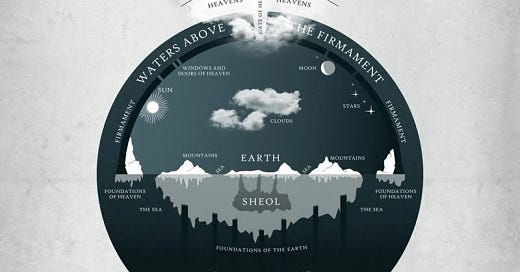


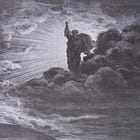
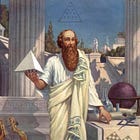
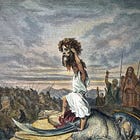


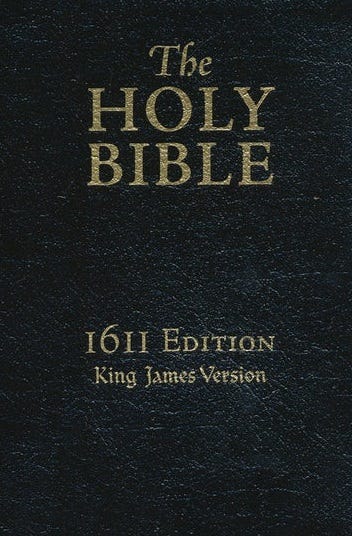

Well-said, brother. God gave us perfection in His Son, not the Sun. The Sun-worshipers need constant blood sacrifices; Son worshipers only needed one to shed His blood for all of us.
Excellent. Astounding to ponder he spent an entire day creating the firmament...